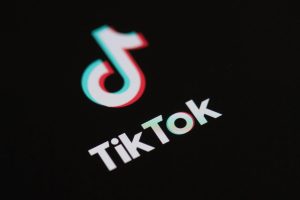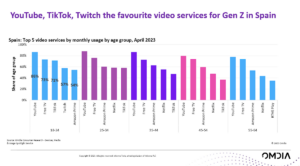
After more than 40 years of operation, DTVE is closing its doors and our website will no longer be updated daily. Thank you for all of your support.
TikTok trumps Netflix: Spanish Gen Z media habits unpacked
 Netflix’s popularity among under-25s in Spain lags behind TikTok, YouTube and Twitch, according to new research from DTVE sister research group Omdia.
Netflix’s popularity among under-25s in Spain lags behind TikTok, YouTube and Twitch, according to new research from DTVE sister research group Omdia.
The findings show that YouTube is the most popular video service in Spain with monthly usage standing at 86% of those aged 18-24.
Free TV comes second with just under 75% using service monthly, followed by TikTok at 71% and Twitch at 57%. Prime Video rounds out the top five, with monthly usage of 54%.
The data contrasts with countries such as the UK: YouTube remains the most popular service among Gen Z here too, again with monthly usage of 86%, but Netflix comes second, followed by TikTok, BBC streamer iPlayer and Prime Video.
Netflix rates among the top five video services with all other age groups in Spain, but Omdia’s senior director Maria Rua Aguete, who presented the findings at the recent Conecta Fiction event in Toledo, said that they highlight the strength of more nascent services with younger generations.
“As a creator or distributor in Spain, it is important to know where your target market’s eyeballs are, and for young people in Spain those eyeballs are firmly affixed to YouTube, TikTok and Twitch,” Rua Aguete said.
“It is also a myth that Gen Z don’t watch linear television as our research indicates numbers for Free TV (terrestrial or DTH) is quite high. The second screen is also critical for gen Z as they use their smartphones to consume a great deal of content.”
TikTok’s youth drive
The findings, which form part of Omdia’s Consumer Research – Devices, Media & Usage Spotlight Service, come as TikTok bolsters its activities across entertainment.
It was the official entertainment partner of the 2023 Eurovision Song Contest in Liverpool, UK through a partnership with the European Broadcasting Union, and offered exclusive content from the event with live performances, interviews and behind the scenes scoops.
This activity generated 4.8 billion views on TikTok and 540 million views of official videos on TikTok, Twitter, Instagram, and Facebook.
TikTok also expanded its sports presence in 2021 with global sponsorship of the delayed UEFA Euro 2020 championship, a deal that it regards as a precursor to further marketing deals in soccer, followed by other deals for UEFA’s Women’s Euro 2022.



